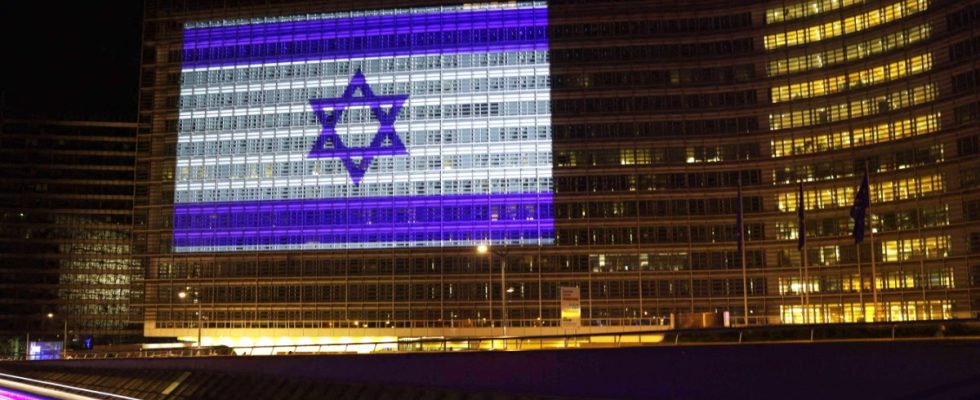It is never easy in the EU to bring together the governments of the 27 member states, the President of the Commission, its various Commissioners, the Foreign Affairs Representative and the President of the European Council. There are disputes between states and institutions – that’s normal. But the chaos that raged in Brussels on Monday was in a category of its own.
That was the theme: In hardly any other conflict in the world are Europeans as divided about what to do, who is right and who is wrong, as in the one between Israel and the Palestinians. It was therefore only a matter of time before, after the initial horror of Hamas’ attack on Israel, the old, very different patterns of interpretation took hold again and the Union collapsed into a pro-Israel and pro-Palestinian camp.
The first nuances became apparent on Sunday: EU Commission President Ursula von der Leyen demonstratively had an Israeli flag projected onto the facade of her office building. In her statements on the X platform (formerly Twitter), she emphasized that Europe stands by Israel. And she wrote: “Israel has the right to defend itself.” Period, end, no restrictions.
Council President Charles Michel, however, declared that he recognized Israel’s right to self-defense. However, he and Palestinian Prime Minister Mohammad Shtajjeh agreed in a phone call that there should be “no further escalation” of violence. Michel did not explain how the two fit together given Israel’s preparations for a military counterattack.
The autonomous authority in the West Bank receives money from the EU, among others
On Monday, the Europeans argued openly about the considerable aid money that the EU spends every year on humanitarian and development projects in the Palestinian territories. According to EU information, in 2022 this support amounted to almost 300 million euros. The money is used, among other things, to finance the Palestinian Authority (PA), which rules the West Bank, as well as schools, hospitals and infrastructure, especially in the West Bank.
The Hungarian EU Commissioner Olivér Várhelyi, who is responsible for part of this money, opened the exchange at X. The EU, he announced in a message, would immediately stop all payments to the Palestinians and review all projects. The content of this decision was supported by Commission Chairman von der Leyen. But Várhelyi published it on his own initiative and too early – before the special meeting of EU foreign ministers planned for Tuesday, who were supposed to discuss exactly this question, among other things.
Várhelyi immediately met with opposition: On the one hand, his Slovenian colleague Janez Lenarčič, who is responsible for emergency aid in the EU Commission, protested. He said in exasperation that money for humanitarian purposes should not be withheld.
On the other hand, a number of EU countries reacted indignantly. Ireland, Luxembourg and Spain, which belong to the pro-Palestinian camp, questioned the wisdom of withdrawing support from Palestinian civilians in the Israeli-occupied territories in order to punish Hamas, which only rules in Gaza. In addition, it would be within the competence of the 27 EU governments to decide on a possible payment stop.
In a press release from the Commission on Monday afternoon there was no longer any talk of stopping payments. Instead, what is happening with the EU money in the Palestinian territories should first be examined in detail, it was said. And: Since there are currently no transfers pending, none need to be suspended. However, this line was counteracted a short time later by EU foreign policy chief Josep Borrell. He announced that the EU Commission’s audit would not affect the “payments due”. Allowing the Palestinian civilian population to suffer only helps the terrorists.
As if the confusion wasn’t big enough, on Monday evening Council President Michel, whose vanity often exceeds his political importance, had his team of speakers tweet: “We must not cut off humanitarian and development aid for civilian Palestinians,” he announced categorically. Not a word about the fact that the EU should check whether its money is actually only flowing into laudable projects locally.
Incidentally, Borrell invited both his Israeli and Palestinian colleagues to the EU foreign ministers’ meeting on Tuesday. If there’s an argument, then right.

